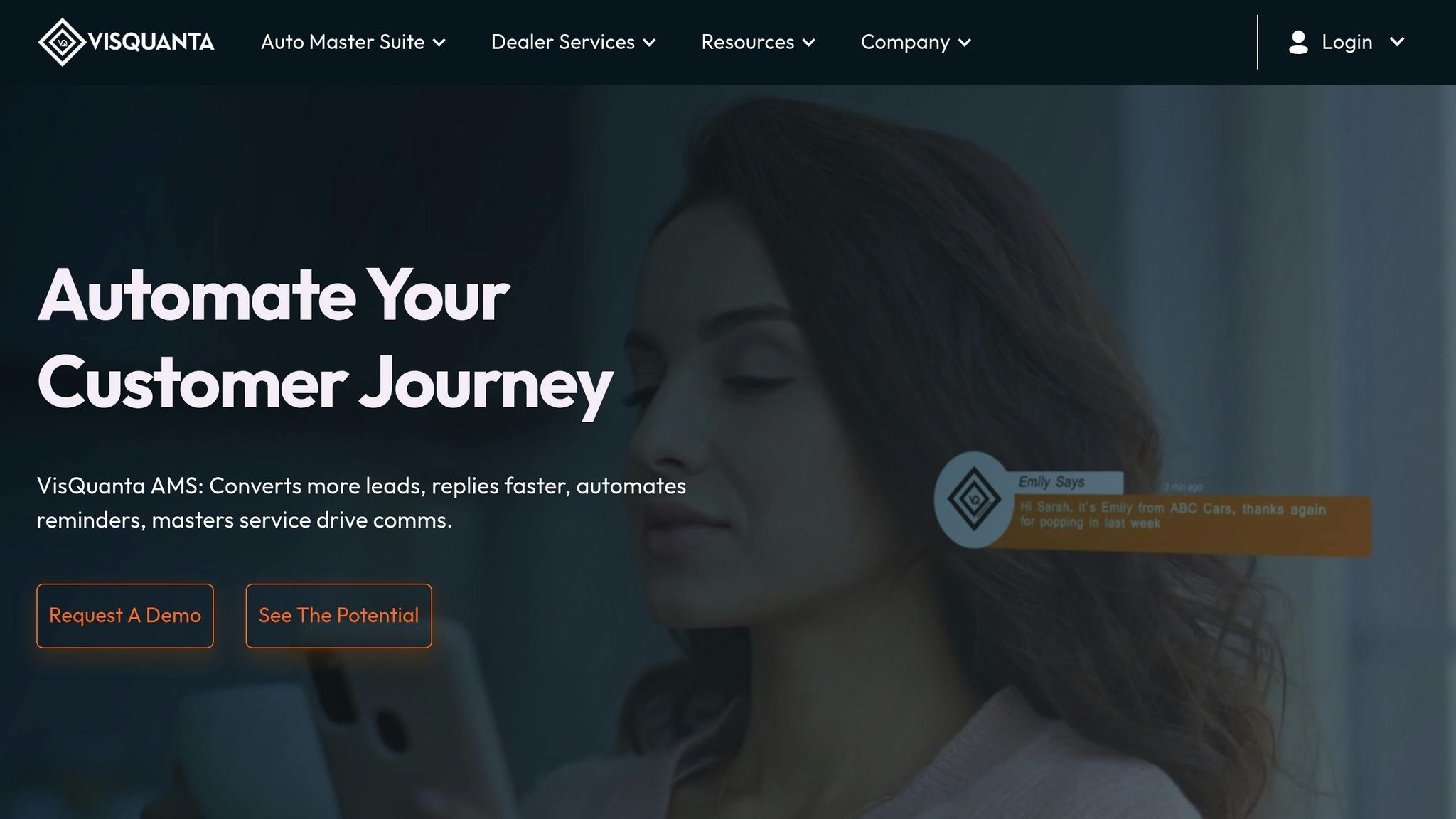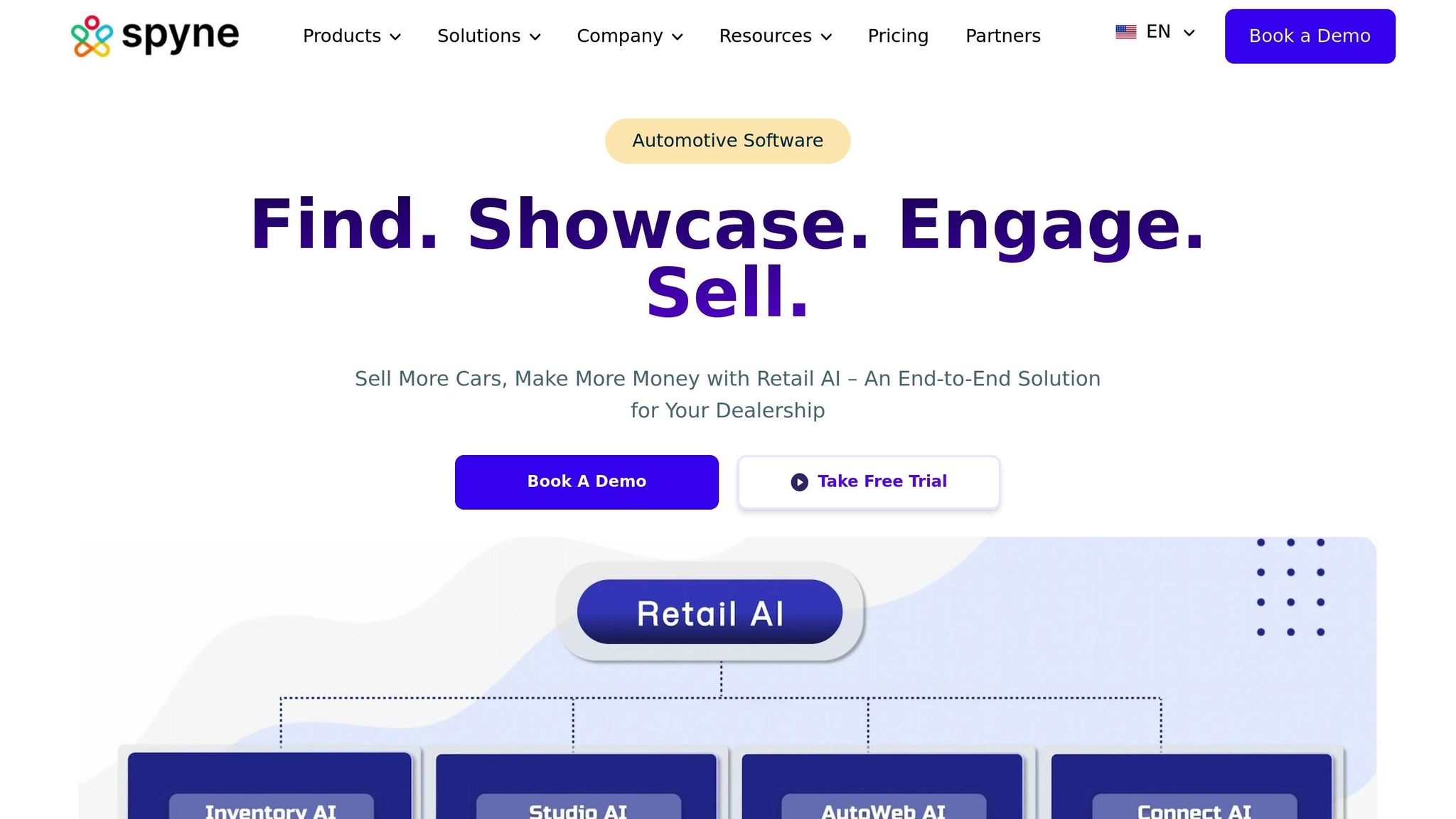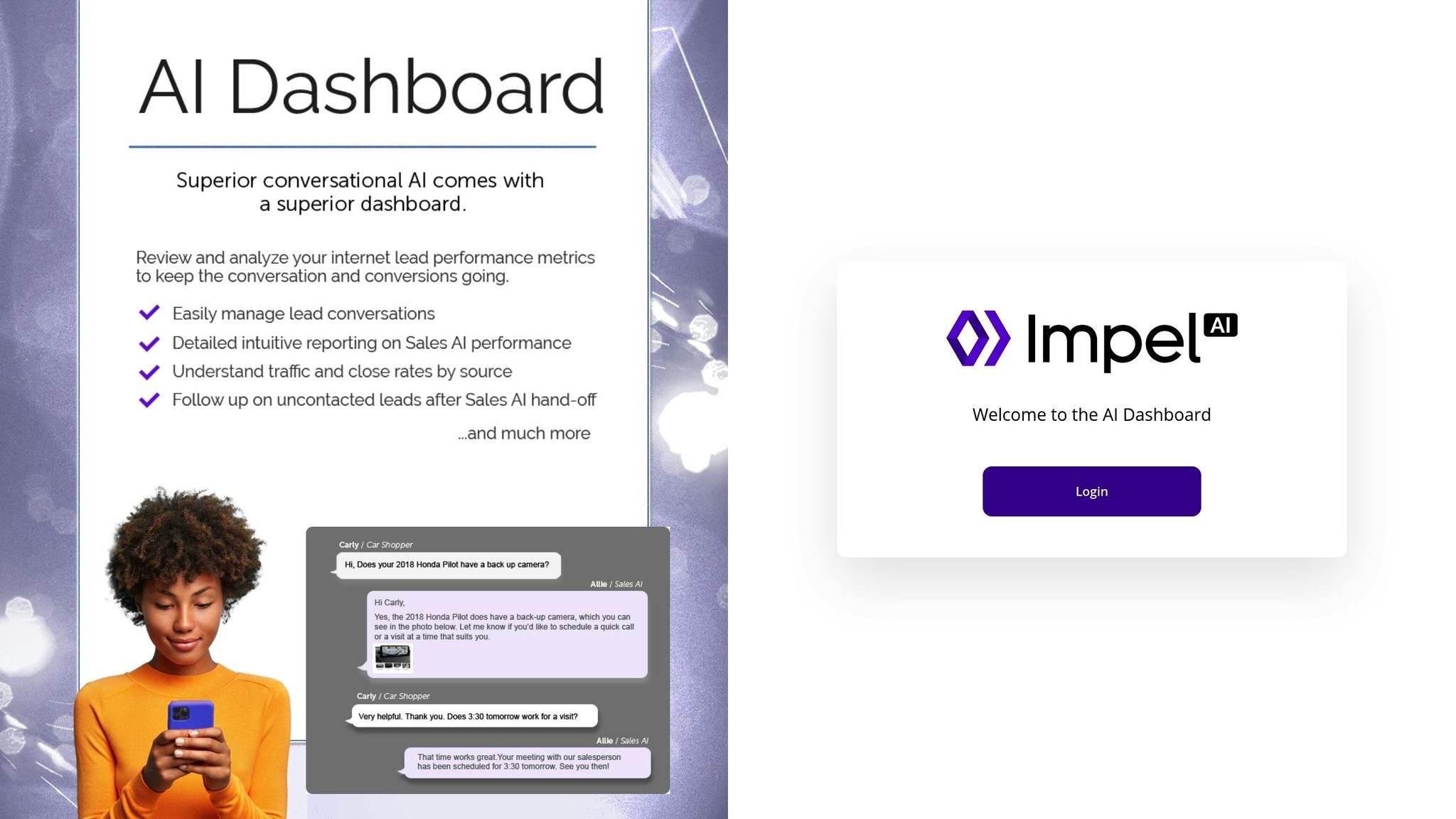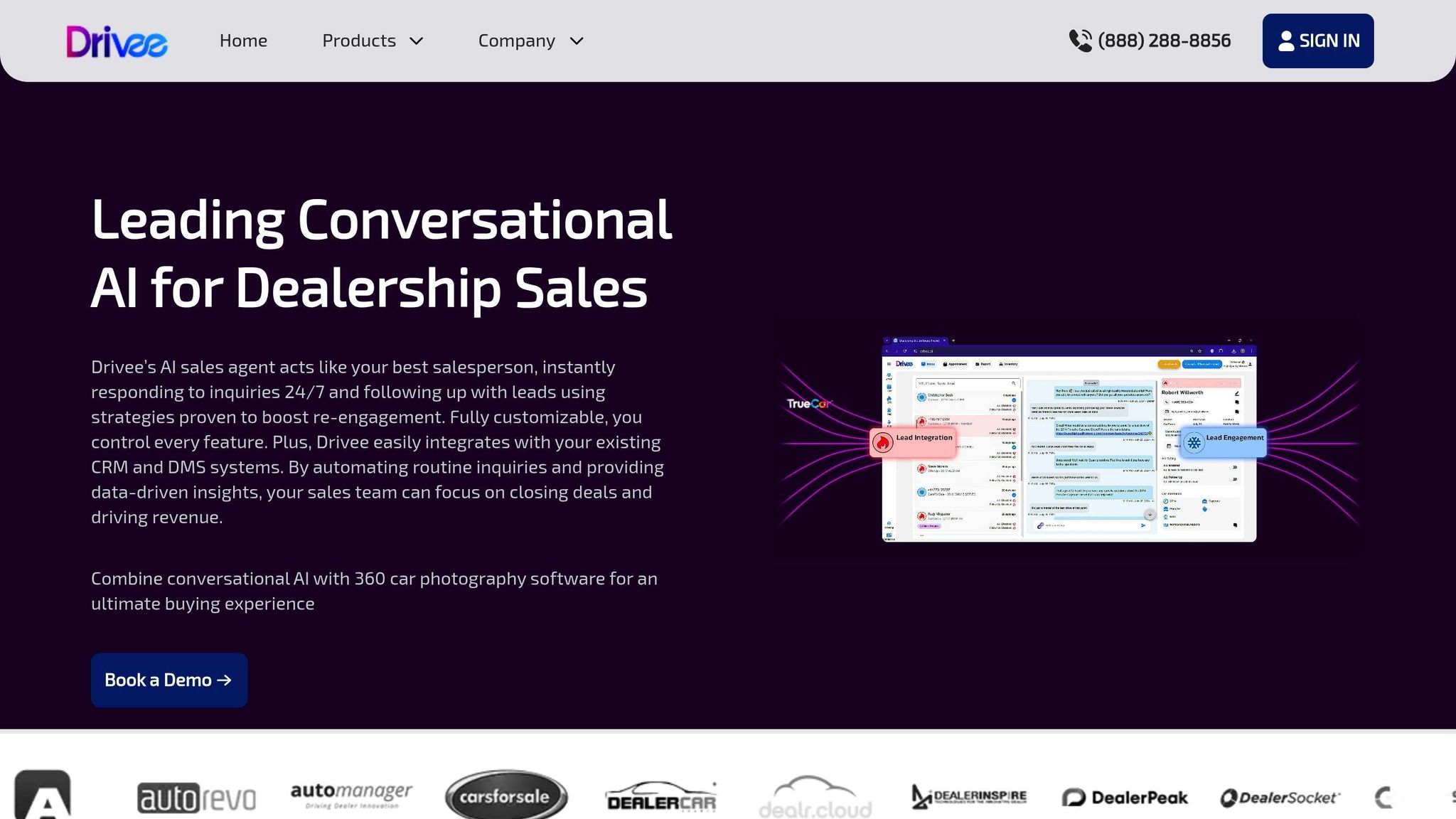The Hidden Revenue Problem
84% of CRM leads go untouched after 30 days: that's millions in latent revenue sitting idle. AI reactivation recovers $50K-$200K monthly from existing databases without new ad spend.
AI is transforming car dealerships by addressing common challenges like lead loss, outdated CRM systems, and inefficient sales processes. This article highlights seven AI tools that help dealerships improve sales, increase revenue, and streamline operations. Key insights include:
- VisQuanta AutoMaster Suite: Enhances lead response times, automates follow-ups, and reactivates dormant CRM data, boosting conversion rates by up to 76%.
- Spyne Retail AI: Reduces response times, improves lead-to-deal conversions by 40%, and integrates seamlessly with CRM systems.
- Impel Sales AI Copilot: Revives inactive leads with personalized outreach and automates routine follow-ups for better efficiency.
- Drivee AI Sales Agent: Acts as a 24/7 virtual sales rep, cutting response times by 37% and reducing no-show rates by 40%.
- AI Chatbots: Provide instant responses, qualify leads, and handle routine inquiries, ensuring 24/7 customer engagement.
- Automated Inventory Management: Tracks stock in real-time, predicts demand, and optimizes inventory to reduce holding costs by 15–20%.
- Predictive Analytics: Analyzes customer behavior to prioritize leads, improve conversion rates by 25–26%, and reactivate dormant databases with ROI up to 100:1.
These tools not only enhance sales performance but also improve customer engagement and operational efficiency. Dealerships adopting AI are seeing measurable results, such as increased revenue, shorter sales cycles, and better customer satisfaction.
Quick Comparison:
| Tool | Key Feature | Result |
|---|---|---|
| VisQuanta AutoMaster Suite | Lead response automation | 76% higher conversion rates |
| Spyne Retail AI | Lead scoring and CRM integration | 40% jump in test drive bookings |
| Impel Sales AI Copilot | Dormant lead reactivation | Higher re-engagement rates |
| Drivee AI Sales Agent | 24/7 virtual sales assistance | 37% faster response times |
| AI Chatbots | Instant customer interaction | 20% reduction in call volume |
| Automated Inventory Management | Real-time stock tracking | 15–20% lower holding costs |
| Predictive Analytics | Customer behavior analysis | 25–26% better conversion rates |
These solutions equip dealerships with tools to stay competitive in a fast-changing market.
Maximize Profits With AI For Car Dealers | Convert Shoppers, Drive Sales
sbb-itb-0329cfa
1. VisQuanta AutoMaster Suite

VisQuanta's AutoMaster Suite is an AI-powered platform designed to tackle the lead management challenges faced by U.S. car dealerships. It focuses on key issues like delayed responses, missed follow-ups, and underutilized CRM data.
Get weekly AI strategies for your dealership
Join 2,500+ automotive professionals. No spam.
Lead Management and Follow-up Optimization
With its Speed-to-Lead (S2L) tool, the suite ensures dealerships respond to leads almost instantly. This is crucial, as research shows responding within five minutes can increase the likelihood of securing a sale by up to 20 times. Yet, many dealerships still face response delays exceeding an hour [3].
"S2L in AutoMaster Suite responds instantly on every channel." [3]
The system gathers leads from multiple sources, including AutoTrader, dealership websites, Facebook, and advertising forms, while filtering out low-quality prospects. At four Colorado dealerships, the suite increased lead response rates from 18% to 72% in just 30 days. One dealership achieved a 75% reply rate, converting 30% of its leads, and collectively, these locations booked 331 appointments in a single month [5].
Beyond the initial response, the suite automates essential tasks like instant call-back scheduling and test drive bookings, significantly reducing scheduling delays. Dealerships using the suite have reported conversion increases of up to 76% during non-business hours [3].
The suite also integrates with CRM systems to reactivate dormant data, further driving sales opportunities.
CRM Integration and Database Reactivation
The AutoMaster Suite's Lead Loss Mitigation (LLM) feature focuses on reviving inactive customer data. By seamlessly integrating with popular CRM platforms, it identifies and re-engages contacts that have gone cold. Dealerships typically rebook 5% to 11% of these previously unresponsive leads, with some achieving conversion rates as high as 25%. Those actively working through their old databases have reported up to a 20% boost in monthly sales [6]. The LLM re-engagement rate often exceeds 30%, meaning nearly one-third of dormant leads are brought back into the sales pipeline [4].
Customer Engagement and Personalization
The suite stands out in its ability to deliver personalized SMS conversations. Incoming leads receive messages tailored to their specific inquiries, ensuring the communication feels timely and relevant. Beyond initial contact, the platform includes Account Reputation Management (ARM), which automates review requests and tracks feedback across various platforms. This helps dealerships maintain a strong online presence while gathering actionable customer insights. Additionally, the AI prioritizes leads through scoring and qualification, allowing sales teams to focus their efforts on the most promising opportunities.
The suite doesn't stop at engagement - it simplifies the entire sales process, boosting efficiency and reducing bottlenecks.
Sales Process Automation and Efficiency
AutoMaster Suite automates the sales workflow from start to finish. It books qualified appointments directly into CRM calendars, eliminating manual data entry and minimizing scheduling conflicts. Automated reminders ensure both customers and sales staff stay on schedule, significantly cutting down on no-shows.
"Most dealers don't have a lead problem - they have a speed problem. Fix that, and you'll see more appointments, more showroom traffic, and more cars over the curb." [5]
The platform also provides real-time performance tracking, fostering healthy competition among sales teams. Metrics like response times, conversion rates, and appointment success are monitored, giving dealerships clear insights into their performance. After implementation, dealerships have reported a 93% improvement in lead response times [4], which directly translates to higher conversions and increased revenue.
2. Spyne Retail AI

Spyne Retail AI simplifies dealership lead management by automating responses and integrating seamlessly with CRM systems. Similar to the VisQuanta AutoMaster Suite, Spyne Retail AI is designed to speed up lead response times and enhance customer engagement.
Lead Management and Follow-up Optimization
At the heart of Spyne's lead management system is its ConnectAI feature, which captures leads from various sources - calls, forms, and bulk uploads - and automates follow-ups around the clock [8]. Leads are prioritized and routed automatically, with instant replies sent via SMS, WhatsApp, and email to maintain quick engagement [9].
The platform's lead scoring system categorizes prospects as hot, warm, or cold, helping sales teams focus their efforts where it matters most. Results speak for themselves: users report a 50% reduction in response times and a 40% jump in lead-to-deal conversions. For example, Car Rocket has cut response times to under two minutes and increased deal closures by 25%, while Urban Wheels saw a 40% rise in test drive bookings [9].
"Spyne's automated lead follow-up system cut response time to less than 2 minutes. Our sales reps are closing 25% more deals!" – Rom Z., Car Rocket [9]
"We saw a 40% jump in test drive bookings within the first month. Spyne makes it easy to stay on top of every opportunity." – Jason Lee, Urban Wheels [9]
CRM Integration and Database Reactivation
Spyne integrates seamlessly with existing CRM platforms, offering real-time lead scoring based on website activity and ad interactions. Its AI capabilities analyze customer buying patterns to predict which leads are most likely to convert, enabling more focused follow-up efforts [10].
The platform also connects directly with websites, Facebook Ads, dealer management systems, and other tools, ensuring lead data flows into the CRM automatically. This eliminates manual data entry and reduces the risk of duplicate or outdated records [11]. Dealerships using Spyne have reported a 29% increase in appointment bookings, a 32% rise in car sales, and stronger customer engagement - with repeat purchases up by 21% and returning customers by 35% [11]. Additionally, the platform leverages historical CRM data to refine models, helping identify strategies that drive conversions most effectively [10].
Customer Engagement and Personalization
Spyne enhances customer engagement by creating detailed profiles and organizing leads based on buying intent. By analyzing purchase history and behavioral patterns, it enables dealerships to launch tailored outbound campaigns [7]. The platform also sends service reminders and vehicle recommendations through its automotive CRM, while AI-powered chatbots and callbots provide 24/7 support [7].
This personalized approach aligns with modern shopping habits - 76% of vehicle buyers research online before making a purchase, and 61% contact dealerships by phone after their search [8]. Spyne's unified customer journey view offers real-time insights, allowing dealerships to manage and improve the customer experience effectively.
Sales Process Automation and Efficiency
Spyne automates the sales workflow, consolidating all customer conversations into a single dashboard. This unified view gives sales teams access to the complete communication history for each prospect [9]. With built-in campaign analytics and reporting tools, dealerships can refine their follow-up strategies, while automated workflows handle lead management without requiring manual input [9].
Carlos Rivera from AutoX Motors shared how automation has transformed his team’s operations:
"Thanks to Spyne, we never miss a hot lead. Our team can focus on selling while the system handles the rest." – Carlos Rivera, AutoX Motors [9]
Spyne's automated lead follow-up system has earned a 4.8 satisfaction rating from over 100 dealerships, highlighting its impact on sales efficiency and customer engagement. Users have reported a 30% increase in engagement across channels, making Spyne a reliable tool for streamlining dealership operations [9]. These automation features provide a strong foundation for a more efficient sales process, complementing other AI tools covered in this article.
3. Impel Sales AI Copilot

Impel Sales AI Copilot is designed to automate lead engagement and reduce the chances of losing leads through personalized interactions. This AI-powered tool reshapes how car dealerships handle their sales pipeline while seamlessly integrating with existing CRM systems.
CRM Integration and Reviving Dormant Leads
One of the standout features of Impel Sales AI Copilot is its ability to breathe life into dormant CRM data. It scans inactive leads, identifies those who haven’t been contacted recently, and sends personalized messages tailored to their past interactions or inquiries. The tool also segments these inactive leads for targeted outreach. If a lead doesn’t respond, it automatically initiates follow-ups. When a lead shows interest again, the system instantly alerts the sales team to step in and continue the conversation. To get the best results, it’s important for dealerships to ensure their CRM data is accurate before implementing the tool.
Building Engagement Through Personalization
The Copilot focuses on creating meaningful connections rather than pushing hard for immediate sales. Its approach involves sending thoughtful, non-aggressive reactivation messages, making prospects more open to reestablishing contact. Additionally, it keeps prospects engaged by sharing relevant updates tailored to their interests. This thoughtful engagement strategy lays the groundwork for a smoother and more efficient sales process.
Automating Follow-Ups for Better Efficiency
The system spaces out follow-up messages and monitors engagement metrics to refine communication strategies. When a lead re-engages, the sales team is promptly notified, allowing them to focus on converting active prospects. By handling routine follow-up tasks, the tool frees up sales representatives to concentrate on closing deals. This optimized workflow not only saves time but also contributes to higher conversion rates, as previously discussed.
4. Drivee AI Sales Agent

The Drivee AI Sales Agent works around the clock as a virtual sales representative, ensuring leads from platforms like CarGurus and AutoTrader are captured and nurtured effectively [12]. What sets it apart is its ability to engage prospects instantly with conversations that feel natural and genuinely helpful.
Smarter Lead Management and Follow-Ups
One of Drivee's strengths lies in its ability to prioritize leads and send follow-up messages at just the right times. Studies show that customers are three times more likely to book when their inquiries receive an immediate response [12], and Drivee ensures that happens with its real-time capabilities. Sales teams are instantly notified when new leads come in or existing customers reach out, keeping them in the loop on every opportunity.
"Drivee's AI sales agent acts like your best salesperson, instantly responding to inquiries 24/7 and following up with leads using strategies proven to boost re-engagement." - Drivee [12]
Drivee also helps reduce appointment no-shows through automated follow-ups and confirmations, cutting no-show rates by 40% [12]. This not only boosts completed sales but also ensures dealerships make the most of their resources. All of these follow-ups align seamlessly with broader CRM strategies, making the entire process smooth and efficient.
Seamless CRM Integration and Reactivating Old Leads
Drivee integrates effortlessly with existing CRM and DMS systems, making it easy for dealerships to leverage their current platforms. This integration allows the system to reactivate dormant leads through tailored messages, ensuring no opportunity is wasted.
"Drivee easily integrates with your existing CRM and DMS systems. By automating routine inquiries and providing data-driven insights, your sales team can focus on closing deals and driving revenue." - Drivee.ai [12]
By bridging data gaps, Drivee ensures that every lead is effectively managed, keeping the sales pipeline running smoothly.
Personalized Customer Engagement
Using customer data, Drivee crafts personalized interactions across various channels, including email, social media, SMS, and voice. Powered by machine learning and natural language processing, the AI anticipates customer needs and offers proactive solutions. It even analyzes voice tone and language patterns to detect emotions, adapting its responses for better communication.
Drivee adjusts its tone, style, and message timing to align with dealership preferences while managing multiple interactions at once. This ensures quick responses without compromising on personalization.
Streamlining the Sales Process
By handling routine inquiries, Drivee frees up sales teams to focus on closing deals. Its ability to manage multiple conversations simultaneously significantly reduces response times and boosts productivity. Customers get immediate attention, while sales teams concentrate on converting qualified leads.
The results speak for themselves - Drivee can cut first response times by up to 37% and resolution times by 52% [13]. With 80% of customers reporting positive experiences with AI-powered customer service [13], dealerships using Drivee can expect happier customers and stronger sales outcomes.
5. AI Chatbots for Dealerships
AI chatbots are reshaping how car dealerships interact with customers and handle sales opportunities. These smart systems operate 24/7, ensuring every potential buyer gets attention while delivering tailored experiences that boost conversions.
The automotive industry has long struggled with customer engagement, particularly outside regular business hours. With 30% of car research happening after dealerships close [16], traditional operations often miss out on valuable opportunities. AI chatbots fill this gap by providing instant responses and keeping customers engaged, even when staff members aren’t available.
Lead Management and Follow-Up
One standout feature of AI chatbots is their ability to manage and nurture leads effectively. They address a common sales challenge: 80% of sales require five or more follow-ups, yet most salespeople stop after two [14]. By automating follow-ups, chatbots ensure prospects stay engaged throughout their buying journey.
These chatbots also qualify leads by evaluating purchase intent, budget, and timing [16]. This allows sales teams to prioritize high-potential prospects, focusing their efforts where it matters most. A dealership utilizing Convin's AI phone calls reported a 30% increase in lead-to-sale conversions and a 50% faster follow-up response time [14]. Such results highlight how automation can significantly enhance both speed and effectiveness in lead management.
Personalized Customer Engagement
Modern AI chatbots go beyond basic question-and-answer exchanges. They analyze customer data to offer tailored recommendations and retain preferences across multiple interactions. This creates a shopping experience that feels personal and helpful, rather than robotic.
Roughly 90% of customer questions are resolved directly by bots [15], while more complex issues are seamlessly escalated to human agents, complete with the full conversation history. This hybrid approach ensures routine inquiries are handled promptly, while human expertise is reserved for more intricate discussions.
CRM Integration and Reviving Dormant Leads
AI chatbots integrate smoothly with CRM systems, ensuring every interaction is logged and accessible for future use. This creates detailed customer profiles that inform both automated and human interactions.
By analyzing past customer behavior, chatbots guide prospects through the sales funnel and can even reactivate dormant leads. They send personalized messages tailored to past preferences and behaviors, making it easier to reconnect with potential buyers. This capability complements other AI tools that optimize CRM data for better results.
Streamlining the Sales Process
Chatbots handle routine tasks like answering initial inquiries, scheduling appointments, and booking test drives. This frees sales teams to focus on closing deals and building relationships. By providing essential information upfront, chatbots also help reduce the overall sales cycle time.
For dealerships considering chatbot technology, the focus should be on AI solutions that address specific challenges, such as missed calls or delayed follow-ups [17]. Customizing chatbot messages and workflows ensures the dealership’s unique voice shines through, making automated interactions feel genuine.
This efficient approach lays the groundwork for further advancements in sales process automation, which will be explored in the next sections.
6. Automated Inventory Management Tools
Automated inventory management tools are reshaping how car dealerships handle their vehicle stock, making it easier to track, organize, and adjust inventory in real time. These AI-driven systems address the tricky balance of avoiding overstock while ensuring no sales opportunities slip by.
The market for AI inventory management is on a rapid rise, projected to grow from $7.38 billion in 2024 to $9.6 billion in 2025, with a CAGR of 30.1% [19]. This shift reflects dealerships moving away from outdated manual processes to embrace real-time automation.
Sales Process Automation and Efficiency
Automated tools simplify tasks like vehicle inspections, stock updates, and vendor coordination, cutting holding costs by 15–20% [1]. This allows sales teams to focus on what they do best - closing deals. By analyzing historical sales patterns and seasonal trends, these systems predict which vehicles will sell quickly, ensuring dealerships stock what customers want when they want it.
For instance, ProfitTime GPS users saw their sales volume increase by 4.5% between Q3 2019 and Q3 2022, while front-end gross profits grew by 17.3% [18]. Trent Waybright from Kelley Automotive Group highlighted the benefits:
"Stockwave has helped us generate more gross and make better decisions." [18]
These systems also integrate seamlessly with CRM platforms, ensuring that inventory data enhances customer interactions, making the entire sales process smoother and more effective.
CRM Integration and Database Reactivation
Integrating inventory management tools with CRM systems creates a unified ecosystem where real-time inventory updates flow directly into customer interactions. This eliminates the risk of outdated listings and allows sales representatives to confidently discuss available vehicles.
Danny Lee from Halt Automotive shared his perspective on the convenience of integrated systems:
"The entire system is very versatile, and everything is one place, my DMS, CRM, Website, and online marketing all in one! The mobile app is killer! I can scan my VINS and scan my customer's drivers licenses to save me so much time!" [20]
This kind of integration not only saves time but also ensures that dealerships provide accurate and timely information to their customers.
Customer Engagement and Personalization
Real-time inventory data plays a key role in improving customer engagement. When a customer inquires about a specific vehicle, the system can instantly confirm its availability or suggest similar options if needed. These tools also support personalized marketing by identifying which vehicles generate the most interest and tailoring promotions accordingly. With the average car buyer visiting only two dealerships before making a decision [21], every interaction must deliver accurate and helpful information.
Beyond inventory tracking, AI-powered pricing models adjust vehicle prices dynamically based on factors like market trends, competitor pricing, customer demand, and seasonal shifts. For dealerships with multiple locations, centralized monitoring and automated vehicle transfers prevent stock imbalances, ensuring each location has what it needs.
These advanced inventory tools enable dealerships to adopt a proactive sales strategy, which is increasingly essential for staying competitive in today’s market.
7. Predictive Analytics for Sales and Marketing
Predictive analytics is reshaping how dealerships approach sales and marketing, offering a way to anticipate customer needs and refine strategies. By turning raw data into practical insights, these tools help dealerships analyze customer behavior, purchase history, and market trends. This allows them to predict future buying decisions and fine-tune their sales efforts. For example, dealerships can track online shopper activity, vehicle searches, trade-in data, and website traffic to identify patterns and focus on opportunities that matter most. The result? Sales teams can zero in on the most promising leads while delivering more personalized experiences.
Lead Management and Follow-up Optimization
When it comes to managing leads, predictive analytics changes the game. It evaluates prospects based on their likelihood to make a purchase, using multiple data points to prioritize leads effectively. This means sales teams can spend their time on customers who are ready to buy. Dealerships using these tools have seen conversion rates improve by 25–26% [27]. Additionally, predictive analytics enables tailored messaging for each customer, ensuring follow-ups are timely and relevant [26]. These lead scores integrate directly into CRM systems, making reactivation campaigns more targeted and efficient.
CRM Integration and Database Reactivation
Predictive analytics doesn’t just enhance sales - it breathes new life into dormant customer databases. By applying advanced segmentation, dealerships can design reactivation campaigns that deliver impressive returns, sometimes as high as 100:1 ROI [22]. Integrating these tools with CRM systems allows dealerships to re-engage 20–50% of inactive contacts, often achieving win-back rates of up to 29% [22][23]. Even a modest 1% response rate from these campaigns can drive meaningful revenue [22]. Real-world examples highlight the impact: Porch Group Media achieved a 29% win-back rate with targeted emails, while another campaign generated $83,000 in revenue from 174 conversions [22]. The key lies in identifying inactive customers who are most likely to re-engage and crafting outreach that aligns with their preferences and past behaviors [22].
Customer Engagement and Personalization
Predictive analytics also empowers dealerships to deliver highly personalized experiences. By analyzing customer data, dealerships can craft communications that resonate with individual preferences and needs. As VinSolutions puts it:
"Predictive insights connect your dealership's CRM with shopper data from online marketplaces that enables dealers to create powerful personalized shopper experiences that drive more sales."
- VinSolutions [25]
The numbers back this up: businesses offering personalized experiences see 40% higher revenue, and dealerships using AI-driven personalization often achieve 15–20% increases in average transaction values. This approach spans multiple channels - email, text, direct mail, and social media - meeting customers where they are. It’s especially critical given that car buyers now visit just 1.4 dealerships on average before purchasing, compared to 4.1 in 2005.
Sales Process Automation and Efficiency
Predictive analytics doesn’t just improve results; it makes the sales process more efficient. By automating routine tasks and providing real-time customer insights, these tools give sales teams a complete picture of each customer, including service history and behavioral patterns [26]. As an expert from automotiveMastermind explains:
"With tools like Mastermind CoPilot, sales teams can automatically generate personalized messaging and follow-ups based on each customer's unique data profile, enabling smarter, faster engagement at scale."
- automotiveMastermind [26]
Rather than replacing human interaction, this automation complements it. Sales teams can focus on building relationships and closing deals while the system handles data analysis, lead scoring, and initial outreach. This approach has been shown to boost customer satisfaction scores by 15–25% in just six months. Predictive analytics also cuts through the noise, helping dealerships identify the most likely buyers and ensuring the right message reaches the right person at the right time [26].
Tool Comparison Table
Below is a detailed comparison of various AI tools designed for dealership operations. This table highlights each solution's core functionalities, integration options, pricing, and standout benefits to help you determine the best fit for your dealership's specific requirements.
| Tool | Core Functionalities | Integration Capabilities | Pricing (USD) | Key Benefits |
|---|---|---|---|---|
| VisQuanta AutoMaster Suite | CRM integration, database reactivation, speed-to-lead automation, reputation management, sales training | Seamless CRM integration with existing dealership systems | Custom pricing based on dealership needs | $8.5M+ revenue generation, reduced lead loss, SMS compliance support |
| Spyne Retail AI | Pricing optimization, market value assessment, trade-in streamlining | API integration with inventory management systems | Contact for pricing | Transparent pricing, smoother trade-in processes, data-driven decision-making |
| Impel Sales AI Copilot | Lead scoring, automated follow-ups, customer journey tracking, sales process optimization | Native CRM connectivity and third-party platform integration | Contact for pricing | Improved lead conversion, tailored customer experiences |
| Drivee AI Sales Agent | Virtual sales assistance, appointment scheduling, lead qualification, customer communication | Multi-platform integration, including websites and CRMs | Contact for pricing | 24/7 customer interaction, automated lead nurturing, faster response times |
| AI Chatbots for Dealerships | Instant customer responses, appointment booking, inventory inquiries, service scheduling | Website integration, CRM synchronization, mobile compatibility | Contact for pricing | Immediate lead capture, 20% reduction in call volume, higher customer satisfaction |
| Automated Inventory Management | Real-time inventory tracking, pricing adjustments, market analysis, stock optimization | DMS integration, third-party listing platforms, accounting systems | Contact for pricing | Accurate inventory insights, optimized pricing, reduced manual workload |
| Predictive Analytics Tools | Customer behavior analysis, lead scoring, sales forecasting, campaign optimization | Deep CRM integration and marketing platform connectivity | Contact for pricing | 25–26% better conversion rates, database reactivation ROI up to 100:1 |
Integration Considerations
Integration is a critical factor when selecting an AI solution. Most tools are compatible with major CRMs like DealerSocket, VinSolutions, and Reynolds & Reynolds, though the level of integration can vary. For example, VisQuanta AutoMaster Suite offers advanced CRM integration, which significantly enhances follow-up efficiency. On the other hand, chatbot solutions often require website integration but can deliver impactful results. A dealership that implemented STELLA AI, for instance, saw a 20% reduction in inbound call volume and achieved a 63% efficiency rate at its Audi store, surpassing the initial target of 30% efficiency[29].
ROI and Performance Metrics
The impact of these tools is measurable and often impressive. Predictive analytics platforms, for instance, consistently deliver conversion rate improvements of 25–26%, while database reactivation campaigns can achieve win-back rates of up to 29% with an ROI as high as 100:1. AI chatbots have also proven to outperform human BDC representatives in lead response and appointment scheduling[29], making them a cost-effective option for dealerships aiming to enhance initial customer interactions. These metrics underscore the value these tools bring to dealership operations.
Choosing the Right Fit
The best tool for your dealership depends on your primary challenges and goals. For example:
- If lead loss is a major concern, VisQuanta AutoMaster Suite stands out with its ability to generate over $8.5 million in additional revenue.
- For dealerships focused on transparent pricing and smoother trade-in processes, Spyne Retail AI offers specialized solutions that build trust with customers.
- Those aiming to improve customer engagement can benefit from AI chatbots, which provide 24/7 availability and instant responses.
Ultimately, the key is to align the tool's capabilities with your dealership's most pressing needs while considering long-term scalability and integration with your existing systems. Each solution offers unique strengths, so evaluating them against your specific operational priorities is essential.
Conclusion
The automotive market is evolving at a rapid pace, and AI tools have become pivotal in tackling the challenges car dealerships face today. From addressing lead loss and outdated CRM practices to streamlining sales processes, these seven AI-powered solutions are reshaping how dealerships operate and engage with customers.
Consider this: AI has been shown to increase lead conversion rates by 32% [30]. In March 2025, Get My Auto shared a compelling case study where one dealership saw a 40% jump in lead-to-appointment conversions, shortened its sales cycle by 33%, and slashed staffing costs by 30% - all thanks to AI implementation [2]. Major players like Ford and General Motors are also leveraging AI chatbots and virtual assistants, which have cut customer wait times by 60% while enhancing engagement [1].
"The biggest challenge in automotive sales is not generating leads - it's following up effectively. Our AI solutions ensure no lead is left behind, engagement is faster, and conversion rates are significantly higher. Dealers using our AI-powered tools have seen up to a 32% increase in conversions and a 25% boost in appointments. In today's market, dealerships that leverage AI don't just compete - they dominate." - Amir Razavi, CEO, Get My Auto / AutoXplorer [30]
These results highlight a broader trend: AI adoption in dealerships is accelerating. Currently, 35% of dealerships in the Get My Auto network have integrated AI tools into their daily operations, with projections indicating this number will reach 50% by the end of 2025 [30]. This shift reflects the growing need to meet consumer expectations for quick, personalized interactions.
AI-powered solutions like the VisQuanta AutoMaster Suite demonstrate how a fully integrated approach can drive tangible results. By tackling lead loss, reactivating dormant databases, and optimizing sales processes, this suite has helped dealerships significantly boost revenue. Other tools, such as Spyne Retail AI for pricing transparency, Impel Sales AI Copilot for tailored engagement, and intelligent chatbots providing 24/7 support, create a comprehensive ecosystem that empowers dealerships to thrive.
From automated follow-ups to predictive analytics, these tools address the most persistent challenges in dealership operations. Together, they’re redefining sales performance, giving dealerships the edge they need to stay competitive. With AI, timely engagement and personalized interactions are no longer optional - they’re the key to long-term success.
FAQs
Frequently Asked Questions
Frequently Asked Questions
.jpg&w=3840&q=75)
5 AI Tools Every Car Dealership Needs to Boost Sales
Boost car dealership sales with 5 proven AI tools. Respond to leads faster, revive dormant prospects, optimize inventory, and increase conversions by 32%.

7 CRM Strategies to Revive Dormant Leads
7 proven CRM strategies to re-engage dormant leads, boost conversions, and turn inactive prospects into loyal dealership customers.

